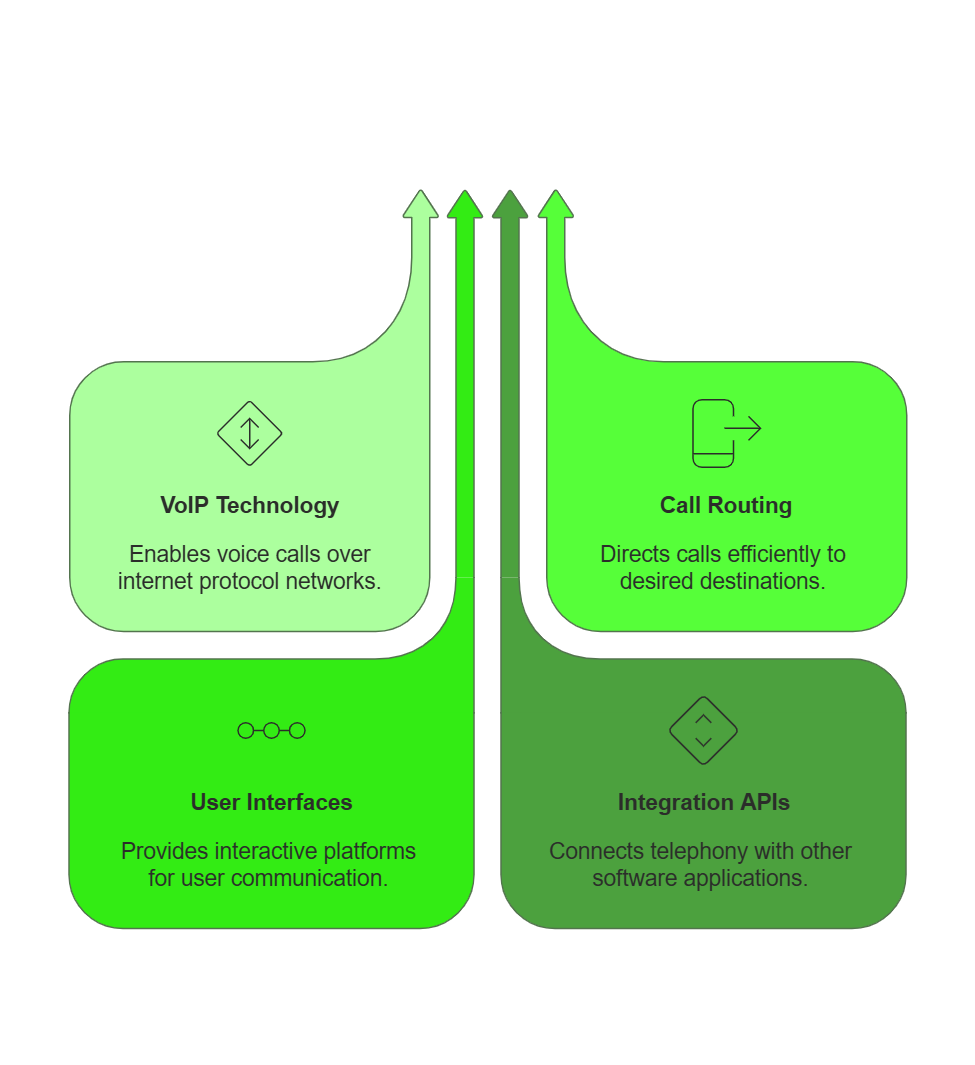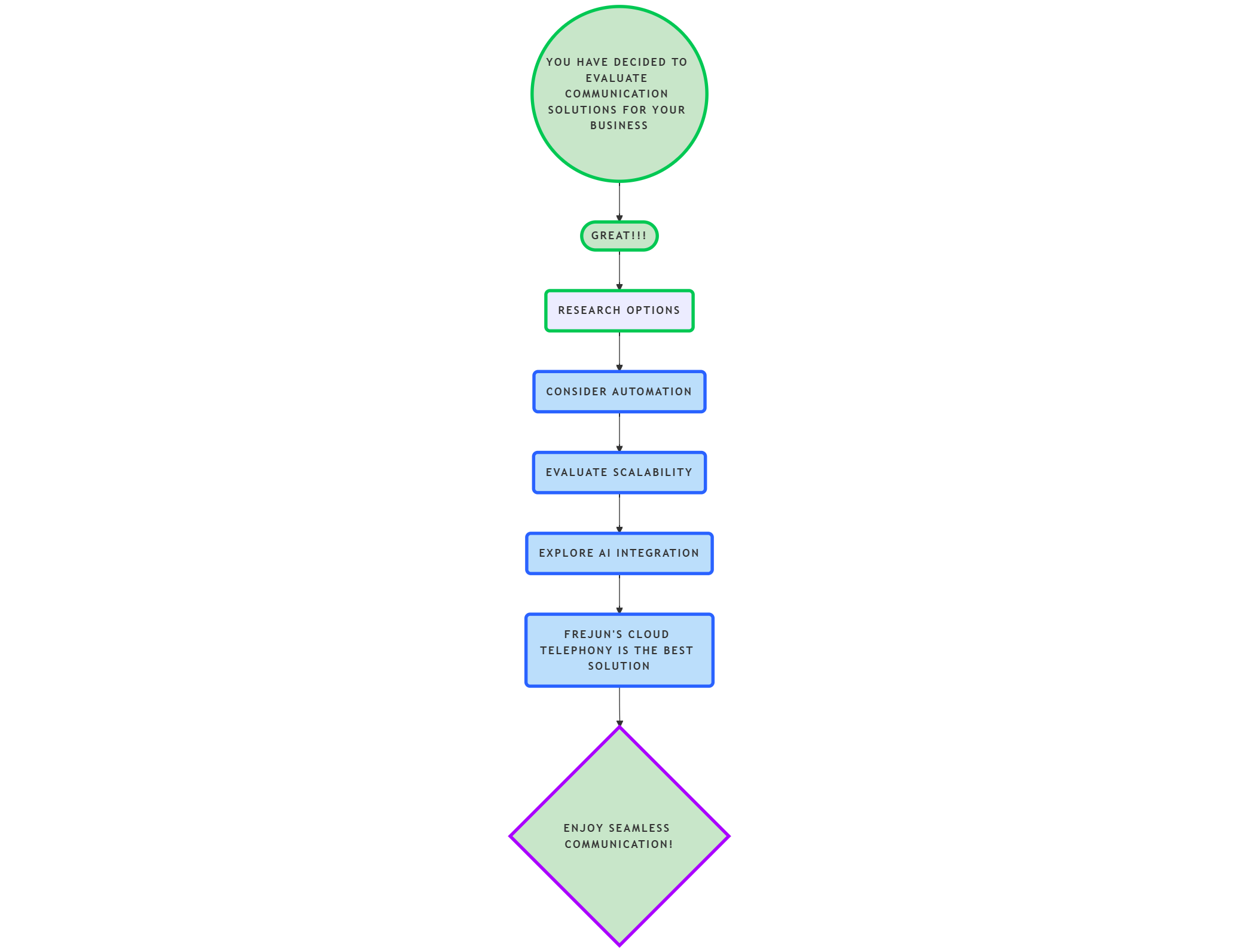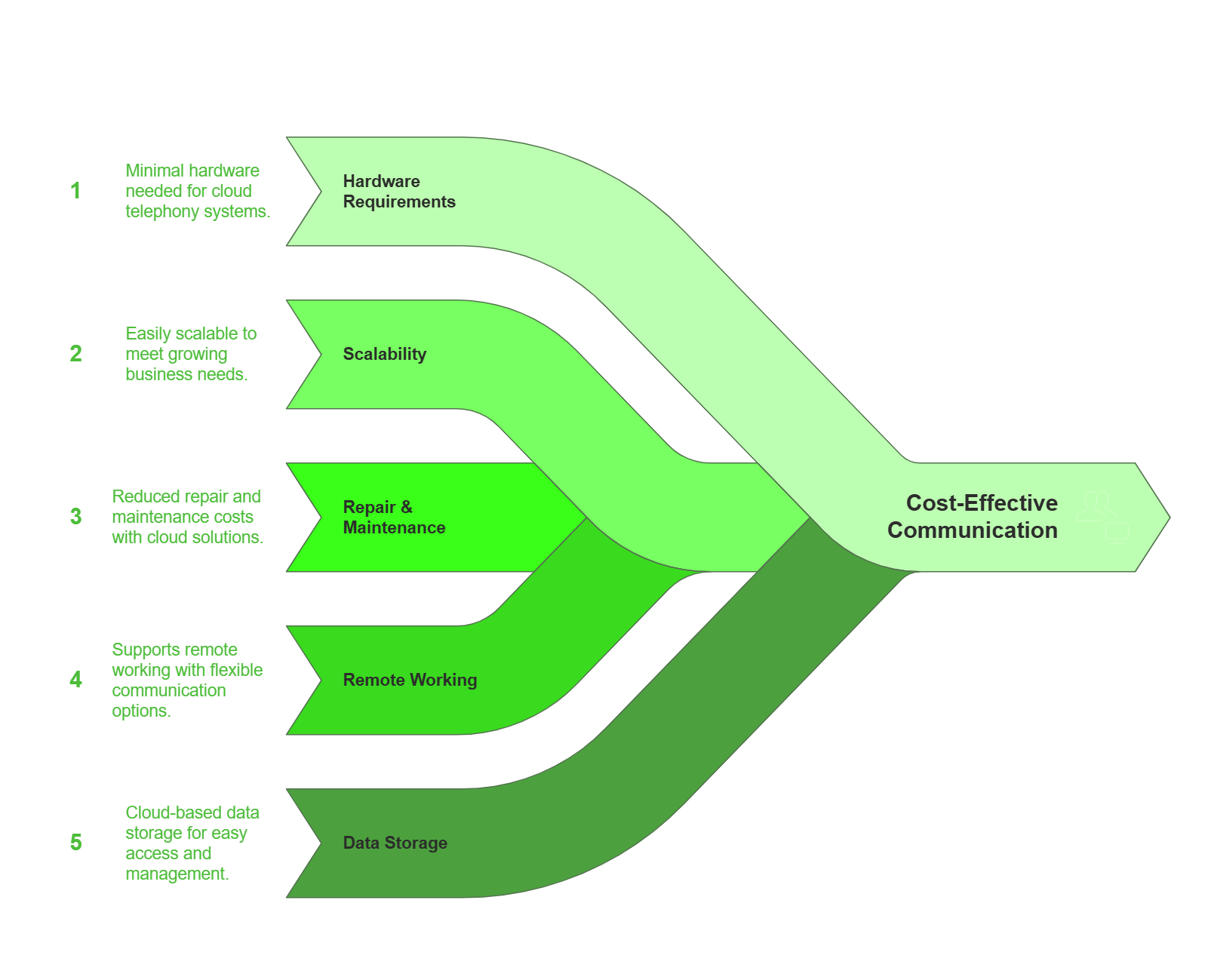Last updated on October 2nd, 2025 at 10:51 am
Cloud telephony and VoIP both enable phone calls over the internet, but cloud telephony offers much more — it removes the need for on-site hardware, scales easily, lowers maintenance costs, supports remote work, stores data in the cloud, and includes features like analytics, call routing, and integrations. VoIP focuses mostly on transmitting calls over the internet, while cloud telephony provides a full communication system for modern business needs.
If you’ve still wondered ‘What’s the difference between VoIP and cloud telephony? or ‘Which phone system is right for small businesses and remote teams? you’re not alone. In 2025, businesses across India, UAE, and other global markets are moving away from traditional phone lines and exploring smarter communication solutions. This guide explains how cloud telephony differs from VoIP, their benefits, and how to choose the right system for your business. A cloud phone system works through a VoIP service provider. Therefore, it does not require complex physical PBX hardware on-site to manage the business calls. Instead, the calls are routed through remote servers hosted on the service provider’s premise which takes care of all the implementation.
Thus, eliminating the upkeep and maintenance cost of PBX (Private Branch Exchange). Two widely adopted solutions are Cloud Based Phone System. While they may seem similar, these technologies differ significantly in scope, features, and ideal use cases. Here’s a breakdown to help you make an informed choice. Cloud Based Phone System are often confused with being the same, but these are two different technologies. Both are types of communications technology but differ in the way they operate and what they provide. This post will explain to you what each one is and the differences between the two.
Table of contents
- What is VoIP?
- What is a Cloud Telephony System?
- Key Factors to Consider When Choosing a Communication Solution
- Difference Between Cloud Telephony and VoIP
- Use Cases of Cloud Telephony and VOIP Calling
- Key Considerations When Choosing
- Summary
- Decision Guide: Which Should You Choose?
- FreJun’s Role / Why Choose FreJun
- Frequently Asked Questions
What is VoIP?
VoIP (Voice over Internet Protocol) is a technology that allows people to make voice and video calls over the internet instead of traditional phone lines. It converts voice into digital signals and transmits them online, making communication cheaper, more flexible, and feature-rich. Popular VoIP services and tools, like Frejun, enable businesses and individuals to enjoy HD calls, call recording, CRM integration, and global connectivity without relying on costly telecom networks.
Earlier, businesses used traditional landline phones or PSTN (Public Switched Telephone Network) to make and answer business calls. However, each telephone line could route only one call at a time. So, if they wanted to make multiple calls simultaneously, they needed multiple phone lines. The VoIP phone system saves the business from such hassles.
What is a Cloud Telephony System?

Cloud telephony, sometimes called a cloud phone system, is built on VoIP technology but offers much more. It includes features like virtual numbers, call analytics, CRM integration, and global communication tools. This makes it ideal for businesses in India, UAE, and Saudi Arabia that need scalability, remote-work readiness, and business calling solutions without investing in heavy infrastructure.
Therefore, it does not require complex physical PBX hardware on-site to manage the business calls. Instead, the calls are routed through remote servers hosted on the service provider’s premise which takes care of all the implementation. Thus, eliminating the upkeep and maintenance cost of PBX (Private Branch Exchange).
A cloud-based solution is entirely virtual and includes several features like call analytics, click-to-call, auto-dial, and many more. Any device with a stable broadband connection, like a laptop, smartphone, tablet, etc., can become a cloud phone.
Key Factors to Consider When Choosing a Communication Solution

Difference Between Cloud Telephony and VoIP

Cloud telephony is a communications system that manages all the phone calls, and VoIP is the connection through which calls are transmitted. Following are the differences between the two:
1. Hardware
A cloud-based phone system does not require any physical hardware other than the phones the system is running on. In contrast, a VoIP phone system requires hardware installation on the office premises.
2. Scalability
A cloud-based phone system provides easy scalability. It is very simple to add new users and expand the phone system along with the business. Whereas in a VoIP system, the installed hardware may only manage a specific number of devices.
Thus, the business will have to install another hardware to handle extra devices if it expands. This is not the case with cloud telephony, as it can be easily updated to accommodate numerous devices.
3. Repair and Maintenance Cost
A VoIP system’s hardware is hosted on-site. Any technical disaster or power cuts will lead to increased downtime hence disrupting the services. Moreover, you will have to incur repair and maintenance costs.
On the other hand, a cloud-based phone system is hosted on the service provider’s premises which takes care of all the technical issues and resolves them without the business worrying.
4. Remote Working
Cloud telephony allows its users to plug in their mobile phones to the system to make calls. It makes working easier for remote employees. They can make and receive calls from any remote location using their mobile phones.
The VoIP phone system does not provide this flexibility and mobility to its users. It only works on the devices within the office premises that are connected to the hardware system or the switch.
5. Data Storage
In cloud telephony, all business information gets saved on the cloud so no data gets lost in any disaster and can be easily recovered. You can access this information from anywhere through an online dashboard. Whereas in the VoIP system, the call data gets saved in the internal data centers.
6. Cost
Even though both cloud telephony and VoIP are affordable alternatives to PSTN networks, the former is considered to be even cheaper than VoIP when it comes to installation and maintenance.
Cloud-based phones and VoIP work together to streamline your business communication process. You can benefit from both technologies by moving your business to the cloud by paying an affordable subscription amount. So, carefully choose a service provider based on your business communication needs.
For a detailed comparison, visit Cloud Telephony vs. VoIP
Use Cases of Cloud Telephony and VOIP Calling
When to Use Cloud Telephony:
- Businesses with remote or distributed teams needing centralized call management
- Startups and SMEs looking for quick deployment and minimal hardware setup
- Companies needing integration with CRMs and advanced analytics for sales or support
When to Use VoIP:
- Cost-conscious businesses wanting affordable international calling
- Teams that already have IP-enabled devices and need basic voice functions
- Organizations with reliable internet infrastructure seeking internal communication tools
Key Considerations When Choosing
When deciding between Cloud Telephony and VoIP, keep these factors in mind:
- Cost: VoIP can be more budget-friendly, but Cloud Telephony often includes more built-in features
- Scalability: Cloud Telephony scales easily with growing teams, while VoIP may require additional setup
- Features: Cloud Telephony offers call routing, IVR, CRM integrations, and analytics out-of-the-box
- Infrastructure: VoIP depends heavily on internet stability, while Cloud Telephony is more adaptable
- Security: Evaluate how each option handles data privacy and compliance based on your industry
Summary
| Parameter | Cloud Telephony | VoIP Calling |
| Hardware | No physical hardware is required. Just phones are sufficient. | Sometimes it might need physical hardware installation at the office premises. |
| Scalability | Offers easy scalability. Extremely simple to add new users. | Limited scalability is offered in some instances. Installed hardware only supports a fixed number of devices. |
| Maintenance | It is completely taken care of by the provider as the system is hosted on their premises. In case of any issues, they will be instantly taken care of by them without any downtime. | If the hardware is hosted on-site, a part of the maintenance has to be taken care of by us. In case of any issues, you will have to incur repair and maintenance costs. |
| Remote Working | Completely supports remote working as users can use their own mobile phones to make calls through cloud telephony. | It might not support remote working if it works only with the devices installed on the office premises. These devices might be connected to the hardware system or the switch. |
| Data Storage | Every data is saved in the cloud. Your data is always safe and doesn’t get lost during a disaster. | If your data is stored in internal data centers, it can be lost during a disaster. |
| Cost | Cloud telephony is comparatively cheaper to set up and manage. | As compared to cloud telephony, VoIP is a pricier option. |
Decision Guide: Which Should You Choose?
If you’re a freelancer or very small business looking only for cheap international calls, VoIP may be enough. But if you’re running a fast-growing business in India, UAE, or Saudi Arabia that needs advanced features like CRM integration, virtual numbers, and call analytics, then cloud telephony is the smarter choice. Think of VoIP as the foundation, and cloud telephony as the all-in-one solution.By understanding the distinctions, you can make an informed decision and choose the solution that aligns with your business goals in 2025 and beyond.
Both Cloud Telephony and VoIP offer powerful communication capabilities, but Cloud Telephony stands out for business automation, AI integration, and multi-channel support. If you’re looking for a future-proof communication system, FreJun’s Cloud Telephony is the best solution for scalability, automation, and efficiency in 2025.
FreJun’s Role / Why Choose FreJun
At FreJun, we provide more than just VoIP international calls. Our cloud phone system is designed for small businesses, law firms, and global teams who want to save costs while scaling seamlessly. With call routing, AI-powered analytics, and easy CRM integration, FreJun ensures your communication is always professional and efficient.
Further Reading- What is VoIP and How Does it Work? – An Ultimate Guide to VoIP
Frequently Asked Questions
Yes, cloud telephony is built on VoIP technology, but it offers much more than just voice calling it includes business-ready features like automated call distribution, call tracking, and reporting.
Yes, both systems work over the internet and support remote usage. However, cloud telephony offers additional support for distributed teams, including dashboards, call recording, and remote monitoring.
Traditional VoIP systems often lack advanced call management features. Cloud telephony platforms like FreJun include smart tools such as call routing, IVR, and scheduling built-in.
Yes, cloud telephony is more scalable. You can easily add new users, numbers, or features without needing new hardware making it ideal for growing businesses.
Cloud telephony is typically better suited for businesses because it’s designed with enterprise features in mind, while VoIP may be more basic and focused solely on voice calling.
Yes, cloud telephony is more scalable. You can easily add new users, numbers, or features without needing new hardware making it ideal for growing businesses.
Cloud telephony is built with modern business needs in mind and integrates smoothly with CRMs, helpdesks, and productivity tools, unlike basic VoIP systems.
VoIP may be cheaper at first, but cloud telephony offers better long-term savings with fewer add-ons.
Yes, cloud telephony often comes with compliance, encryption, and built-in security protocols.

Thankyou for all your efforts which you have put in this. worth it to read info .